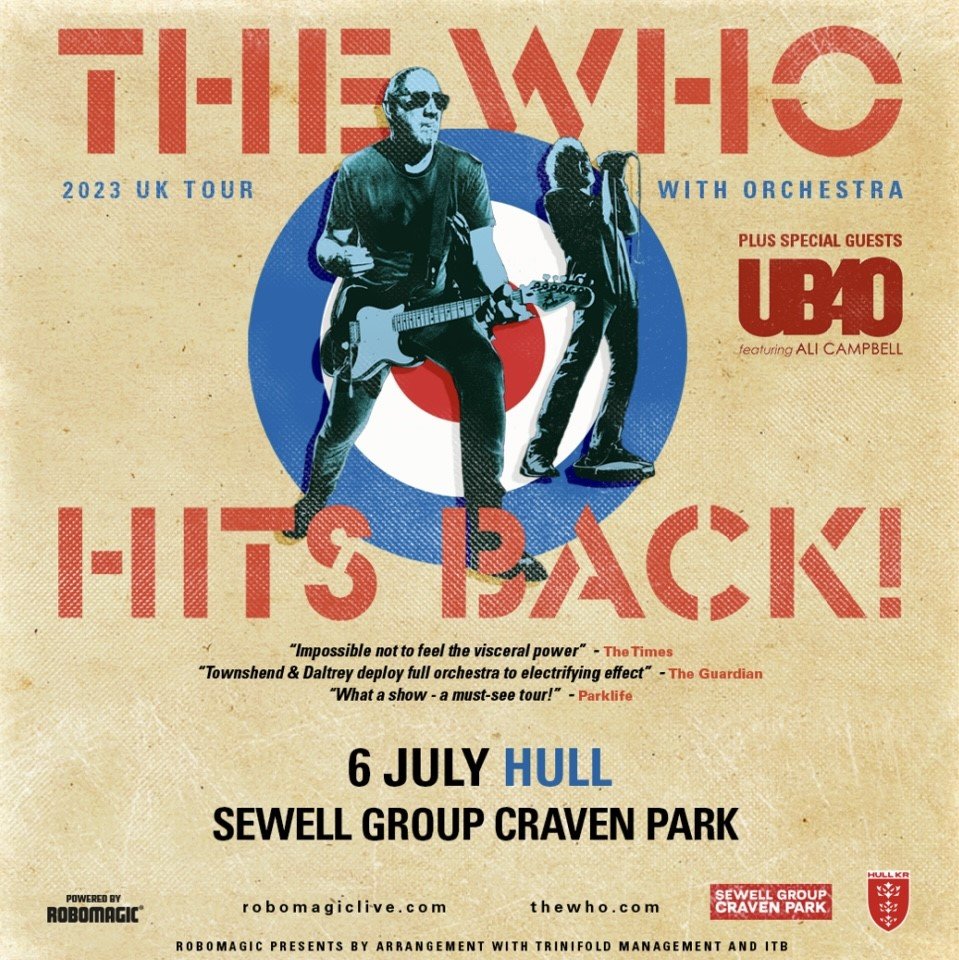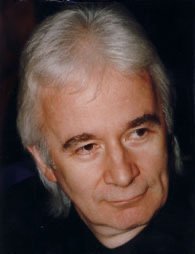‘The Who were stunning on their first show in Hull. I paid them £250’
‘VISCERAL POWER’: The Who play Hull on Thursday
By Angus Young
As legendary rockers The Who prepare to play at Hull KR’s Craven Park, the man behind the band’s first gigs in Hull recalls how they changed his life and set him on a stellar career in the music business.
It was 1966 and the Sixties were in full swing when Ed Bicknell left his home in Tadcaster to study for a degree in social studies at Hull University.
“The day after I arrived at Hull in October 1966 they were running a Freshers’ Ball. As I entered the Students’ Union, a message on the tannoy said: ‘If anyone in the building can play drums please come to the reception’. Since I was standing right next to the receptionist, without thinking I just said: ‘Yes, I can.’
“It turned out the drummer in the band they had booked was too sick to play and they didn’t have any records to dance to. I was led off to the dressing room to meet the Victor Brox Blues Train who, coincidentally, had played in Tadcaster the previous week, and was introduced to the band.
“I was asked: ‘Are you any good?’ I replied: ‘Yes, OK I think. By the way, I know you lot. You played my local hall last week. How much are you going to pay me?’ After much haggling, we settled on £5. My first deal.”
Once recruited, Ed made a confession. He told his new bandmates he hadn’t actually been to the Tadcaster gig and had only seen the posters for it around town. As such, he had no idea what songs they played. Luckily, his charm won them over while the band’s setlist of soul classics were the same songs he’d played hundreds of times before in previous groups.
“I did the gig – two 45-minute sets, no screw-ups, big hugs, £5 pocketed and off to the bar where Malcom Haigh, the Students’ Union social secretary, asked if I wanted to be on the entertainment committee and join his jazz group.”
When not studying, Ed’s first year in Hull was split between playing in the band, running the student jazz and folk clubs (“I have no idea how or why I managed that”) and helping stage dances and small concerts in the various halls of residence, including Needler Hall in Cottingham where he moved to after “a grim year in digs in Pearson Avenue eating meat pies with no meat”.
Ed Bicknell
In October 1967 at the start of his second year he took over the running of the Students’ Union entertainment office. “There was no election. Malcolm, my predecessor, simply said: ‘Don't be a daft sod, don't have an election. You do it, I'm off to do my finals’. That was that.
“Once I took over the committee (who were a fantastic, very organised and supportive bunch), I made one defining decision – I would put on the bands that I liked and somehow sell them to the student audience, which included a technical college next door and a teacher-training college nearby. There were about 10,000 to 12,000 students to draw from and it couldn’t have been better timewise.
“Many artists who went on to huge and sustained success were literally surviving off the college circuit which was extremely vibrant back then. Plus we had the good fortune to be close to Sheffield and Leeds universities and I arranged for bands playing there to come over to Hull and vice versa.
“Much of The Who’s Live in Leeds album was actually recorded at Hull City Hall (after I had left) but as Pete Townshend said to me many years later: ‘Live in Hull doesn’t have quite the same ring about it’. Very droll is our Pete.
“When I was in Hull it was long before motorways, bypasses and bridges over the Humber and getting acts to even consider coming up from London was very difficult. In fact, one or two simply never made it.”
He still has a list of all the bands he booked to play in Hull and how much he paid them. The Who were paid £250 for their first show and £350 for a follow-up visit. Others included Jimi Hendrix (£350), Pink Floyd (£150 and £300 for a second show at The Lawns in Cottingham), The Kinks (£350) and Jethro Tull (£400 – largely as a result of having a Top Three single at the time).
“I kept all the contracts and I can’t remember a bad show,” recalls Ed. “Actually there was one – Manfred Mann, who we put on at Beverley Road swimming baths with a wooden floor over the pool. They had a bad night and voluntarily sent back £75 of the £300 fee. Amazing. That would never happen now.
“With that exception, the rest were all great. Pink Floyd did a bit of performance art at their first show. During one piece the roadies came on and boiled a kettle. The whistle in the spout produced exactly the right note at the right point in the song.
HEYDAY: The cover of Who’s Next, The Who’s fifth studio album, released in 1971
“It won't surprise anyone to know The Who were deafening and smashed everything up at the end of My Generation. Keith Moon’s drum kit ended up in the audience and when they had finished no-one applauded but no-one left. They were too stunned. It was brilliant.
“After that show by The Who I decided on a career in showbiz which, as it turned out, worked out OK.
“We had two local bands who I would regularly pay £50 to support. Mandrake Paddle Steamer from Scarborough with a certain singer called Robert Palmer (RIP) and a blues band from Hull called The Rats featuring Mick Ronson, Trevor Bolder and Woody Woodmansey, who became David Bowie's Spiders from Mars. They were great musicians and even better guys who I stayed in touch with right up to Mick’s sad passing in April 1993.
“When some of the acts sold too many tickets for the Union building we had to move them either into the Mecca Ballroom or the Skyline Ballroom in Hull and these shows were open to the general public.
“Mandrake Paddle Steamer had the dubious honour of following Hendrix at a Skyline show in March 1967. It was particularly intimidating for them because at the end of Wild Thing, Hendrix stuck his guitar in the ceiling tiles and it was still howling with feedback as he walked past me on the way back to the dressing room at the end of his set. All I could say was: ‘F****** great’, which solicited a big grin from him.
“I must say the entire university experience could not have been better in terms of the career I eventually fell into. After failing abysmally as a ‘professional’ drummer and being sacked from an embryonic Average White Band for not being Scottish (in truth, I wasn’t good enough), I accidentally bumped into one of the agents who used to try and sell me his c***** bands on Oxford Street in early 1970.
“He said: ‘I can't pay you anything but you can have half of everything you earn for the office’. Those words are still stamped on my mind as if they were spoken yesterday. So with no money, no immediate prospects and despite the fact he had no acts, I took up his offer and some years later had the good fortune and huge luck to see a new band looking for management playing in a tiny London club for £25 while renting a PA system. That band was Dire Straits and that night changed my life.”
Ed went on to manage Dire Straits as they became one of the world’s best-selling bands. He also managed Mark Knopfler as a solo performer, Gerry Rafferty, Paul Brady and The Blue Nile during a glittering career but still puts his success down to his student days in Hull.
“Everything I learned about music promotion and management at university came into play, even the law and economics part of the degree. Lesson one: If you can’t read a poster from the top of a double decker bus it’s not going to be worth diddly squat. Who it is, where it is and how much is all you need.
“It took me three years in Hull to learn that. I had the best time there.”
This article is based on an original featured in the University of Hull Alumni Association’s magazine in 2015.
Become a Patron of The Hull Story. For just £2.50 a month you can help support this independent journalism project dedicated to Hull. Find out more here



